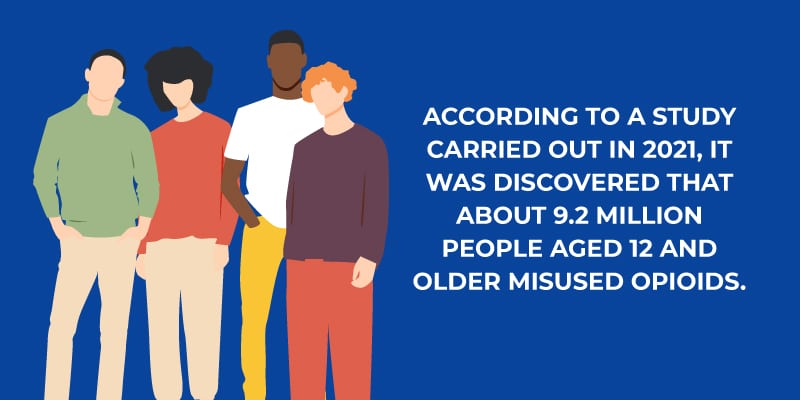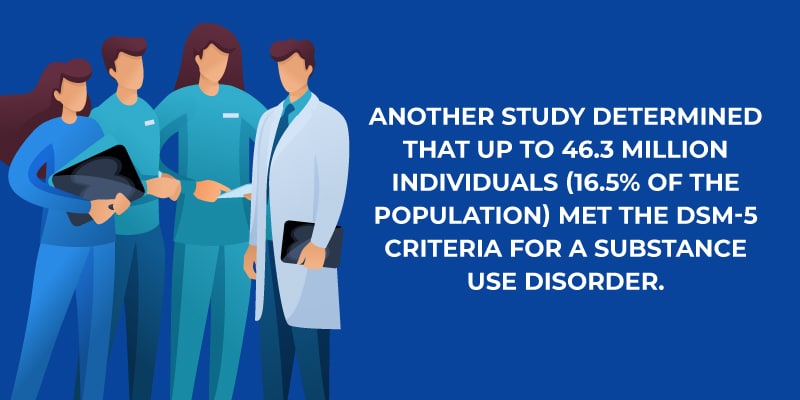
Comprehensive Approaches to Substance Use Disorder Treatment
Learn more about the different options for substance use disorder treatment and how J. Flowers Health Institute can help you heal.
Table of Contents
Introduction
Substance use disorder (SUD) is a debilitating condition. It is currently a serious condition affecting millions of people worldwide. The good news is, there are several substance use disorder treatment options available.
What to Expect from This Article
In this article, we’ll take a close look at what substance use disorder is. Next, we’ll explore several different available substance use disorder treatment options.
We’ll also take a look at how these treatment options differ from each other. Finally, we’ll discuss how you can get effective treatment at J. Flowers Health Institute.
What is Substance Use Disorder?
Substance use disorder is a complex and chronic condition. It’s characterized by the recurrent and problematic use of substances. This includes substances like drugs or alcohol.
This use continues despite the negative consequences associated with substance use. It is often referred to as addiction or substance abuse.
A Closer Look at SUD

Diagnostic Criteria for Substance Use Disorder
Substance use disorder gets diagnosed based on specific criteria. This criteria is outlined in the Diagnostic and Statistical Manual of Mental Disorders (DSM-5). The DSM-5 is a widely accepted manual used by healthcare professionals.
Below are the criteria for diagnosis.
Impaired Control
This can include:
- Difficulty controlling substance use
- Unsuccessful attempts to cut down or quit
- Spending a significant amount of time obtaining, using, or recovering from the substance
Social Impairment
This includes:
- Substance use that leads to recurrent problems in relationships
- Failure to fulfill major responsibilities at work, school, or home
- Withdrawal from social or recreational activities
Risky Use
Pharmacological Criteria
This includes the following:
- The development of tolerance (needing increased amounts of the substance to achieve the desired effect)
- Experiencing withdrawal symptoms when substance use gets reduced or stopped
Types of Substance Use Disorder Treatment
There are many types of substance use disorder treatment available. But, each SUD treatment has its own unique approach to addressing addiction.
These treatment modalities encompass a range of interventions, therapies, and support systems. They are often tailored to meet the specific needs of each person.
Some common substance use disorder treatment options are detailed below.
Outpatient Treatment
Outpatient treatment offers more flexibility than the inpatient option. It allows patients to receive substance use disorder treatment while residing at home.
Outpatient programs provide:
- Counseling
- Therapy sessions
- Education
- Support groups
They’re suitable for people with a stable home environment and mild substance use disorders. Outpatient treatment allows people to maintain their daily responsibilities. They do so while taking part in their recovery.
Inpatient Residential Treatment
Inpatient residential treatment involves patients living in a facility for a designated period. This period often ranges from a few weeks to several months. These programs offer 24-hour support and a structured environment.3
Focus of Residential Treatment
They focus on:
- Detoxification
- Therapy
- Counseling
- Skill-building
Inpatient treatment allows people to immerse themselves in a recovery-oriented environment. It also helps keep them away from triggers and distractions.
Medication-Assisted Treatment (MAT)
Medication-assisted treatment combines medications with counseling and behavioral therapies.4
Medications are used to:
- Help with withdrawal symptoms
- Reduce cravings
- Restore normal brain function
A Closer Look at MAT
Medications Used in MAT
Common medications used in MAT include methadone, buprenorphine, and naltrexone. The medication used in substance use disorder treatment depends on the substance involved.
This approach aims to reduce cravings, reduce withdrawal symptoms, and promote long-term recovery.
Behavioral Therapies
Behavioral therapies play a critical role in substance use disorder treatment. They help to address the psychological and behavioral aspects of addiction.
Below are some commonly used behavioral therapies.
Cognitive-Behavioral Therapy (CBT)
CBT helps people change negative thought patterns and behaviors associated with substance use. It focuses on:5
- Building coping skills
- Developing healthy habits
- Managing triggers and cravings
What is Cognitive Behavioral Therapy?
Motivational Interviewing (MI)
MI is a client-centered approach. It helps patients explore and resolve their ambivalence toward substance use. It aims to increase motivation for change and foster a commitment to recovery.
Contingency Management (CM)
CM is a reward-based approach. It provides incentives for patients to remain abstinent from substances. It reinforces positive behaviors and promotes adherence to treatment goals.
Support Groups
This includes support groups like Alcoholics Anonymous (AA) or Narcotics Anonymous (NA). They offer peer support and a sense of community for people in treatment.
These groups provide a supportive environment for people to share their experiences. People also get encouragement from others who have faced similar challenges.
Holistic and Alternative Therapies
Holistic and alternative therapies complement traditional treatment approaches. They address the mind, body, and spirit. These therapies may include:
- Yoga
- Meditation
- Acupuncture
- Art therapy
- Equine therapy
- Mindfulness practices
They aim to reduce stress, promote self-awareness and enhance emotional well-being. They also support recovery.
Aftercare and Continuing Care
Aftercare programs are crucial for sustaining recovery and preventing relapse. These programs may include:
- Ongoing counseling
- Therapy sessions
- Support group participation
- Alumni programs
Continuing care provides people with ongoing support as they transition back into their daily lives. This helps them maintain their sobriety and address any challenges that may arise.
Integrated Treatment
It’s important to note that substance use disorder treatment approaches are often integrated. It involves many modalities used in combination to address the complexity of addiction.

The Roles of Medication-Assisted Therapy (MAT) in Substance Use Disorder Treatment
Medication-assisted therapy (MAT) plays a crucial role in substance use disorder treatment. MAT combines medications with other approaches to address the complex nature of addiction.
Below are some key roles of MAT in substance use disorder treatment.
Reducing Withdrawal Symptoms and Cravings
MAT uses medications to manage withdrawal symptoms. These symptoms can be a significant barrier to recovery. Withdrawal symptoms often contribute to relapse. This is because people may use substances to reduce discomfort.
MAT helps people transition from active substance use to a stable state. This decreases the severity of withdrawal symptoms and reduces cravings.
Normalizing Brain Function
Substance use disorder alters brain chemistry. This leads to imbalances in neurotransmitters and disrupted reward pathways.
Medications used in MAT can help normalize brain function. They do this by interacting with specific receptors involved in addiction.
Examples of MAT Use
For instance, methadone and buprenorphine act on opioid receptors. This reduces withdrawal symptoms and stabilizes brain chemistry.
Naltrexone blocks the effects of opioids and alcohol. This prevents the rewarding effects and reduces the likelihood of relapse.
Increasing Treatment Retention
MAT has been associated with increased substance use disorder treatment retention rates. They help people remain engaged in substance use disorder treatment for longer periods.
Extended treatment engagement allows people to receive ongoing support, counseling, and therapy. This enhances the likelihood of successful recovery.
Reducing Overdose Risk
MAT has been shown to reduce the risk of overdose, especially in opioid use disorder. Medications like methadone and buprenorphine are long-acting and provide stable opioid effects.
This reduces the risk of overdose associated with illicit opioids. Additionally, naltrexone blocks the effects of opioids, rendering them ineffective if relapse occurs.
Enhancing Treatment Effectiveness
MAT enhances the effectiveness of substance use disorder treatment. Medications provide a foundation of stability and control. This enables people to better engage in therapeutic interventions.
The combination of medication and psychosocial support addresses all aspects of addiction. This promotes long-term recovery.
Key Components of an Effective Substance Use Disorder Treatment Plan
A comprehensive treatment plan for substance use disorder encompasses various components. These components work together to address the complex nature of addiction. These components are tailored to the individual’s needs. They often involve a combination of evidence-based approaches.
Below are some key components of a substance use disorder treatment plan.
Assessment and Evaluation
This is the initial step in substance use disorder treatment. It involves gathering information about:
- The individual’s substance use history
- The individual’s physical and mental health
- Social circumstances
- Treatment goals
Benefits of Assessment and Evaluation
The assessment helps to:
- Determine the severity of the substance use disorder
- Identify co-occurring disorders
- Inform the development of an individualized treatment plan
Detoxification
For people with significant substance dependence, detoxification may be necessary. It helps to safely manage withdrawal symptoms.
It is also useful in helping them to achieve a stable state. Detoxification is often conducted under medical supervision. This is done to ensure the person’s safety and comfort.
Individual and Group Counseling
Individual counseling provides a safe and supportive environment. Here, patients are able to work one-on-one with a therapist or counselor.
It allows for personalized discussions and exploration of underlying issues. It also allows for developing coping strategies specific to the individual’s needs.
Group counseling involves taking part in therapy sessions with peers facing similar challenges. Group settings provide support, encouragement, and the opportunity to learn from others’ experiences.
Educational Programs
Educational programs aim to provide people with:
- The knowledge and understanding of substance use disorder
- Its effects on physical and mental health
- Strategies for relapse prevention
Psychoeducational sessions and workshops equip people with the tools and information necessary to make informed decisions. They also help them understand triggers and develop effective coping mechanisms.
Aftercare Planning and Ongoing Support
Aftercare planning is a critical component of a comprehensive treatment plan. It involves developing a personalized plan for ongoing support and relapse prevention. Aftercare often commences once formal treatment concludes.
What Does Aftercare Typically Entail?
Aftercare may include:
- Continued counseling or therapy
- Participation in support groups
- Involvement in alumni programs
- Access to community resources that promote sustained recovery

Challenges and Considerations When Seeking Substance Use Disorder Treatment Alongside Co-Occurring Disorders
Co-occurring conditions often go with substance use disorder. When this happens, several challenges and considerations need to be taken into account. The presence of both conditions presents unique complexities that need specialized care.
Below are some of these key challenges and considerations.
Integrated Treatment Approach
Co-occurring disorders need an integrated treatment approach. This approach addresses both the mental health condition and substance use disorder.
The challenge lies in finding a treatment program that is equipped to handle the complexity of dual diagnosis. The treatment program should have professionals trained in treating both conditions together.
Integrated treatment ensures that both disorders get addressed effectively. It also ensures that treatment plans get tailored to the individual’s specific needs.
Diagnosis and Assessment
Proper diagnosis and assessment are crucial when dealing with co-occurring disorders. It is essential to identify the specific mental health condition and substance use disorder accurately.
But, the presence of one condition can often mask or mimic the symptoms of the other. This leads to misdiagnosis or incomplete assessment. This is why it is crucial to work with professionals experienced in dual diagnosis.
Complex Interplay of Symptoms
Co-occurring disorders often exhibit complex interplay. The symptoms of one condition can worsen or influence the other.
For example, substance use may act as self-medication for underlying mental health issues. But, substance abuse itself can worsen mental health symptoms.
Treating one condition without addressing the other is dangerous. This is because it can lead to incomplete recovery and potential relapse. It’s vital to have a treatment plan that considers the intertwined nature of both disorders.
Increased Vulnerability to Relapse
People with co-occurring disorders may be more vulnerable to relapse. This is in comparison to those with a single diagnosis.
The challenges of managing co-occurring disorders contribute to a higher risk of relapse. This is especially true if support and relapse prevention strategies aren’t in place.
Continuous monitoring, ongoing therapy, and access to support networks are essential components of treatment. They can help to mitigate the risk of relapse.
Pharmacological Considerations
When treating co-occurring disorders, careful consideration must be given to pharmacological interventions. Some medications may interact with substances of abuse. They may also impact the effectiveness of psychiatric medications.
It’s crucial to work with professionals who have expertise in dual diagnosis. They will help you determine appropriate medications for substance use disorder treatment. They will also help you manage any potential interactions or side effects.
Addressing Underlying Trauma and Triggers
Co-occurring disorders often have underlying trauma or triggers. These can contribute to their development and maintenance. Addressing triggers related to both conditions is crucial for effective treatment.
Creating a safe and supportive environment allows people to explore their trauma. It also allows them to develop healthy coping strategies for successful recovery.
Stigma and Treatment Engagement
The stigma associated with co-occurring disorders can hinder treatment engagement. Individuals may be hesitant to seek help due to fear of judgment or societal stigma.
Creating a supportive and non-judgmental treatment environment is vital. This is because it’ll encourage people to seek substance use disorder treatment.

Emerging Trends in Substance Use Disorder Treatment
In the field of substance use disorder treatment, several emerging trends and innovative approaches are being explored. These methods help to enhance effectiveness and improve outcomes for individuals seeking recovery.
Note that these advancements are constantly evolving. While they show promise, their effectiveness is still being studied and refined.
Here are a few emerging trends in substance use disorder treatment:
Telemedicine and Digital Interventions
Telemedicine and digital interventions have gained prominence. This is especially in the context of substance use disorder treatment. These technologies provide remote access to counseling, therapy, support groups, and medical consultations.
They offer convenience and privacy. They also offer the chance for people to get treatment and support from the comfort of their own homes. Research is ongoing on them. But, preliminary evidence suggests that telemedicine can improve treatment accessibility and engagement.
Precision Medicine
Precision medicine focuses on tailoring substance use disorder treatment to individuals. This is done based on their unique genetic, biological, and environmental factors.
By analyzing a person’s genetic makeup, treatment providers can optimize medication selection. They can also optimize dosage and treatment approaches.
Precision medicine has the potential to improve treatment outcomes by personalizing interventions. But, further research is necessary to establish its full effectiveness.
Mindfulness-Based Therapies
This includes mindfulness-based therapies like mindfulness-based relapse prevention (MBRP) and mindfulness-based stress reduction (MBSR). These approaches are gaining attention in substance use disorder treatment.
They emphasize present-moment awareness and non-judgmental acceptance. They also emphasize the development of coping strategies to manage cravings and stress.
Research suggests that incorporating mindfulness-based therapies can enhance relapse prevention. It is also believed to improve emotional well-being and promote recovery.
Find Effective Substance Use Disorder Treatment at J. Flowers Health Institute
Are you or a loved one seeking effective substance use disorder treatment? If you are, then J. Flowers Health Institute has the luxury accomodations you need for sustainable recovery.
At J. Flowers Health Institute, our dedicated team of world-renowned experts is committed to helping you overcome addiction.
We will tailor a personalized, cutting-edge treatment plan to fit your unique needs and circumstances. We will help you discover recovery in a way that meets your lifestyle.
Contact J. Flowers Health Institute Today
Reach out to us today, and let us help you overcome substance use disorder for good and begin leading the happy, healthy, and fulfilling life you deserve.
Resources
- https://www.nimh.nih.gov/health/topics/substance-use-and-mental-health#:~:text=Substance%20use%20disorder%20(SUD)%20is,most%20severe%20form%20of%20SUD.
- https://www.verywellmind.com/dsm-5-criteria-for-substance-use-disorders-21926
- https://www.healthline.com/health/substance-use/inpatient-vs-outpatient-rehab
- https://www.fda.gov/drugs/information-drug-class/information-about-medication-assisted-treatment-mat
- https://www.nhs.uk/mental-health/talking-therapies-medicine-treatments/talking-therapies-and-counselling/cognitive-behavioural-therapy-cbt/overview/#:~:text=Cognitive%20behavioural%20therapy%20(CBT)%20is,mental%20and%20physical%20health%20problems.
- https://www.webmd.com/mental-health/addiction/addiction-detox-what-to-know





